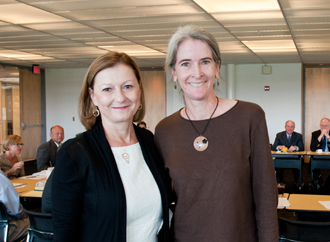Environmental director receives leadership award
The first recipient of the Yvette Milner Jones Award is Liz Davey, director of the Tulane Office of Environmental Affairs. A surprised Davey received a check for $5,000 from Tulane President Scott Cowen at the university's Administrative Council meeting on Monday (Sept. 12).

Liz Davey, right, environmental affairs director, is congratulated by Yvette Jones, executive vice president for university relations, after Jones presents her with the first Yvette Milner Jones Award. (Photo by Sally Asher)
The award, which goes to an outstanding Tulane staff member or administrator, is named in honor of Jones, executive vice president for university relations and development.
“The Yvette Milner Jones Award was established by the Tulane University Board in recognition of Yvette's longstanding leadership, dedication and tireless services to the advancement of Tulane,” Cowen said. “Today, we are presenting the inaugural award to an individual whose superior achievement, dedicated service and involvement at Tulane reflects the high standards set by Yvette.”
Selection committee member Anne P. Baños said Davey was chosen as the inaugural recipient “because of her exemplary leadership in the areas of Tulane's sustainability and environmental responsibility, her ability to build partnerships and relationships to facilitate the university's goals in this regard, and her demonstrated innovation in her work.” Baños is vice president for administrative services.
During the presentation, Cowen called Davey “a quiet bridge-builder.”
The Tulane Office of Environmental Affairs was launched after a student wrote an honors thesis proposing how to “institutionalize greening at the university,” Davey says. At the time, Davey was working on an environmental sustainability committee at Michigan State University. In 1999 Tulane named Davey its first sustainability manager one of only a few in the country.
“It was a unique position and an inspiring idea that a university should be a laboratory for sustainability practices, and we could provide learning opportunities for students at the same time,” says Davey.
She is delighted by the number of students who have gone on to pursue careers involving environmental sustainability, and excited by Dinwiddie Hall becoming the first LEED-certified building at Tulane. The university is pursuing LEED certification for four other projects, including Weatherhead Hall.
